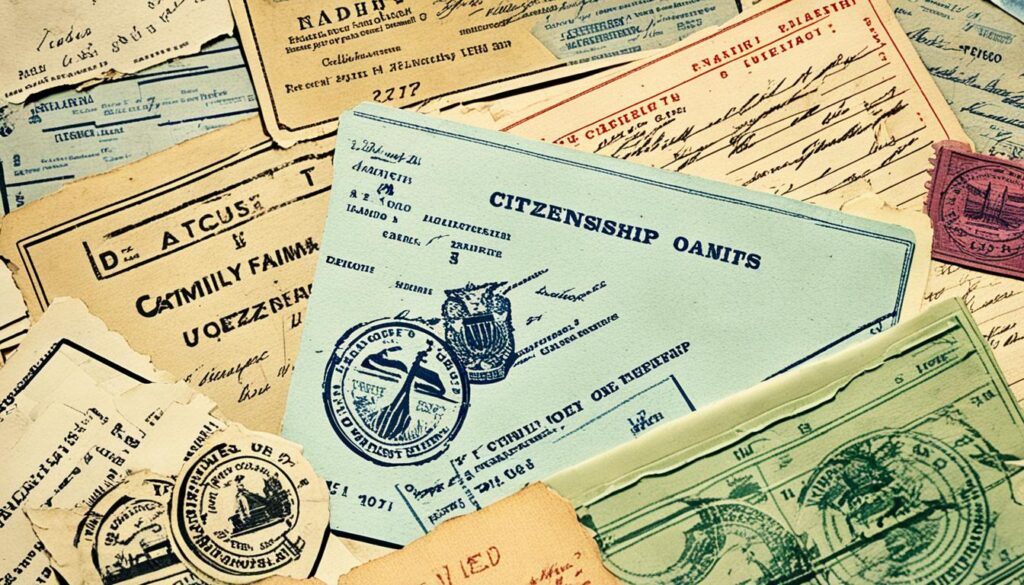Last Updated on: 30th August 2024, 08:10 pm
Citizenship By Descent offers individuals a unique opportunity to reaffirm their connection to their ancestral homelands, transcending modern borders and fostering a profound sense of belonging to a historical narrative. This form of heritage citizenship illuminates paths to dual nationality, global mobility, and access to new worlds of opportunity, grounded in one’s familial and cultural history. With professional legal expertise, such as that offered by the Harvey Law Group, individuals can navigate the intricate legal frameworks required to facilitate this type of citizenship acquisition.
For instance, Italian consulates in the United States are experiencing an overwhelming number of applications for Italian Citizenship by Descent, with statistics indicating a clear trend of increasing requests that surpasses the consulates’ processing capacity1. In response, alternative avenues such as the Italian court system have become more popular, especially for cases involving the “1948 Rule”1. Similarly, various European nations like Ireland and Poland have made notable strides in offering lineage-based citizenship, thereby enhancing global mobility and lifestyle benefits2.
Key Takeaways
- Citizenship By Descent reconnects individuals with their ancestral roots.
- It offers pathways to dual nationality and enhanced global mobility.
- Professional legal expertise can facilitate navigating the complex legal landscape.
- Notable increases in applications observed in countries like Italy and Ireland12.
- Streamlined processing in some cases, like the new Italian Tribunal rule1.
Contact us if you are Interested in Buying Property Abroad!
What is Citizenship By Descent?
Citizenship by descent, also known as ancestry citizenship or descendant citizenship, is a process whereby individuals can acquire citizenship based on their heritage. This legal right is rooted in the principle of Jus Sanguinis, which acknowledges nationality by blood and is recognized by many countries worldwide.
The Concept of Jus Sanguinis
The concept of Jus Sanguinis underpins ancestry citizenship by anchoring a person’s citizenship eligibility in their family lineage. Essentially, if you have a parent or grandparent who was a citizen of a specific country, you may qualify for descendant citizenship in that country. Jus Sanguinis supports maintaining cultural identity and familial connections across generations.
Ancestral Link and Nationality
Ancestry citizenship often requires individuals to prove a direct ancestral link to a citizen of the country. The criteria and documentation required can vary significantly among nations, which impacts citizenship eligibility. Countries such as Italy, which adheres to Jus Sanguinis, allow individuals to gain nationality by demonstrating that an Italian ancestor did not acquire foreign citizenship before the birth of their descendant in another country3. Many countries offer this form of citizenship, including those in Europe, Asia, the Americas, and Africa4.
Benefits of Citizenship By Descent

Citizenship by descent provides a myriad of advantages, making it an attractive option for many. One of the primary benefits is enhancing global mobility, granting individuals the potential for visa-free travel to numerous countries. This allows holders to explore new opportunities and expand their professional and educational prospects.
Global Mobility
For those with dual citizenship, obtaining a second passport can significantly simplify international travel. For instance, applying for citizenship by descent in countries like Ireland and Italy, where eligibility can span several generations, opens the door to traveling freely across the European Union5.
Expanded Opportunities and Rights
Holding dual citizenship can embed individuals into the economic and cultural fabric of their new country, granting them access to local benefits. From professional opportunities to social services, the rights accorded to citizens by descent are extensive. For example, in South Africa and India, the presence of established legal pathways for descendants underscores the significance of recognizing ancestry for expanded rights and privileges5.
Cultural and Emotional Connections
Beyond practical benefits, citizenship by descent fosters cultural and emotional connections. Reconnecting with one’s ancestral heritage enriches personal identity and provides a profound sense of belonging. Exploring cultural identities and customs tied to one’s lineage can be deeply rewarding, melding people back into their roots. This emotional journey is a critical aspect of why many seek citizenship based on their descent, bridging past and present generations.
Overall, the benefits of pursuing citizenship by descent are compelling, encompassing enhanced global mobility, expanded rights, and a deeper connection to cultural and ancestral heritage. This path not only provides practical advantages but also binds individuals to their familial legacy, enriching their personal and professional lives deeply.
Understanding Citizenship Eligibility

Gaining citizenship through lineage-based eligibility involves comprehending various citizenship requirements, which vary from country to country. It’s essential to carefully examine both direct lineage requirements and generational limitations to ensure a successful application. This section delves into these critical aspects to help you understand the criteria involved.
Direct Lineage Requirements
To satisfy citizenship requirements through descent, individuals typically need to establish a direct connection to a citizen parent. For instance, children born outside the U.S. may acquire U.S. citizenship through U.S. citizen parents either at birth or before the age of 186. Moreover, individuals born outside the United States to a U.S. citizen parent must meet conditions such as having at least one U.S. citizen parent and the parent having lived in the U.S. for a specified period6. Providing documented family history and proof of ancestry is pivotal in these cases.
Generational Limitations
Generational citizenship often comes with specific restrictions imposed by the nation’s laws. For instance, children born in wedlock to two U.S. citizen parents acquire U.S. citizenship at birth if one parent has been a resident in the U.S. prior to the child’s birth7. Different countries may also impose gender or residency-based criteria for generational citizenship eligibility. Children born abroad may still become U.S. citizens after birth if they meet eligibility criteria detailed in the USCIS Policy Manual, Volume 12, Part H, Children of U.S. Citizens6.
Additionally, children residing outside the U.S. may obtain citizenship under Section 322 of the Immigration and Nationality Act if they meet conditions that include having a U.S. citizen parent or grandparent who meets specific physical presence requirements in the U.S. or an outlying possession6. It’s crucial to understand these conditions to navigate the path towards generational citizenship effectively.
Required Documentation for Citizenship by Descent

Securing citizenship by descent involves careful preparation and submission of various important documents. These documents are crucial in substantiating one’s lineage and proving eligibility for citizenship based on ancestral connections. The submission of appropriately authenticated and translated documents helps streamline the citizenship application process and ensures compliance with national guidelines.
Proof of Ancestry
Applicants need to submit valid *ancestry documents*, such as birth certificates, that demonstrate a clear lineage to the relevant ancestor. It’s vital that these documents, including U.S. birth certificates, meet specific requirements, such as being issued within one year of birth and bearing the registrar’s signature along with a seal or stamp from the issuing authority8. These measures ensure the credibility and authenticity of the documents presented.
Birth and Marriage Certificates
Birth and marriage certificates play a significant role in establishing familial connections. These documents must often be accompanied by professional translations and notarized verification letters to validate accuracy8. For example, in Italian citizenship applications, all vital records except original Italian certificates need legalization or an apostille and must be translated into Italian9. This meticulous documentation work helps affirm the applicant’s claims regarding their family lineage and ties.
Nationalization Records
To maintain the integrity of the citizenship line, nationalization records or certificates must be provided in some cases. For instance, proving legitimation for citizenship through the naturalization of parents can be done by submitting a certified court order or the parents’ marriage certificate dated after the child’s birth8. Additionally, filing searches for past U.S. passports or Consular Reports of Birth Abroad entails a fee of $150, which is part of the necessary documentation costs8. Adhering to these requirements is imperative for a successful *citizenship application* process.
For further details on the required documentation and guidelines, applicants can refer to the comprehensive checklist provided by the U.S. Citizenship and Immigration Services in Form M-4778.
Contact us if you are Interested in Buying Property Abroad!
Citizenship Application Process: Step-by-Step Guide

Embarking on a Citizenship by Descent application requires diligent attention to each phase of the process. This Application process guide will detail every step, making it easier to navigate the Immigration application steps effectively.
Researching Eligibility
Before commencing your Citizenship by Descent application, it’s crucial to research eligibility criteria thoroughly. For those filing an N-400, applicants must be at least 18 years old, have been a permanent resident for at least five years (or three years if married to a U.S. citizen), or fulfill military service requirements10. The revised N-400 even provides more options for eligibility compared to previous versions11.
Gathering Necessary Documents
After establishing eligibility, the next step involves gathering all required documentation. The new N-400 form allows applicants to submit additional information in Part 14, if necessary11. Essential documents include proof of ancestry, birth and marriage certificates, and any other documentation proving your link to ancestors who were citizens1210. If you are applying based on marriage to a U.S. citizen, you’ll need to provide proof of marriage11.
Submitting the Application
Once all necessary documents are ready, you can proceed to submit your Citizenship by Descent application. Filing the N-400 online offers a $50 discount and provides immediate access to a filing receipt and other USCIS notices11. Remember, online filing requires access to a computer, internet, and an email account11.
Awaiting Processing and Follow-Up
After submission, the waiting period begins. USCIS schedules biometrics appointments and naturalization interviews10. If additional evidence is needed, USCIS will notify you, and failing to provide correct documents or missing an interview could delay the process, potentially adding several months10. The final decision will be communicated through a mailed notice or electronically if you filed online12.
Legal Guidance for Citizenship Applications

Navigating the legal intricacies of Citizenship By Descent often necessitates professional legal guidance. An immigration law firm can provide invaluable support throughout the application process, ensuring adherence to relevant citizenship laws and regulations. This bolsters the likelihood of achieving a positive outcome.
Law firms specializing in immigration and citizenship, such as the Harvey Law Group, offer over 30 years of expertise in crafting tailored immigration solutions. By leveraging their experience, applicants receive strategic advice meticulously tailored to each stage of the application, simplifying complex legal processes. Moreover, legal assistance ensures applications are comprehensive, accurate, and timely, thereby reducing the risk of delays or rejections.
Before October 29, 2019, USCIS considered children of U.S. armed forces or government employees stationed outside the U.S. to meet the requirement of “is residing in” the U.S. for citizenship under INA 32013. However, effective October 29, 2019, USCIS amended its policy to declare these children ineligible for citizenship acquisition under INA 32013. On March 26, 2020, the Citizenship for Children of Military Members and Civil Servants Act was enacted, amending INA 320 to allow these children to acquire citizenship13. The amendment applies to children under the age of 18 as of March 26, 202013.
An effective immigration law firm will ensure all eligible individuals are aware of such critical legislative changes. Their expertise in citizenship law becomes essential in navigating these updated regulations. DNA testing is a requisite for proving genetic relationships, with buccal swabs being the preferred method due to their ease of collection, non-invasiveness, and accuracy14. The industry standard reliability for DNA paternity and maternity testing is 99.99% accuracy14.
Persons born abroad to U.S. parents may have acquired citizenship at birth, contingent on the law in place at the time of birth and parental physical presence in the U.S15.. Interestingly, U.S. citizens eligible to transmit citizenship must file for a Consular Report of Birth Abroad (CRBA) before their child’s 18th birthday15. Legal assistance is pivotal in gathering and validating documentary evidence necessary for establishing citizenship transmission, thus ensuring a smooth and successful application process.
Here is a comparative table showcasing various acts related to military service and naturalization:
| Act | Description | Year Enacted |
|---|---|---|
| Act of May 9, 1918 | Provided exemptions for World War I servicemen from naturalization requirements. | 1918 |
| Second War Powers Act | Enabled naturalization of U.S. armed forces members serving domestically and abroad. | 1942 |
| Act of June 1, 1948 | Revised naturalization provisions for individuals serving honorably during World War I or II. | 1948 |
| Lodge Act | Authorized naturalization for noncitizens who enlisted overseas, completed five years of service, and were honorably discharged. | 1950 |
| Vietnam Hostilities Act | Allowed naturalization for service during the Vietnam War period. | 1968 |
| Hmong Veterans’ Naturalization Act | Provided special consideration for Laotian refugees supporting the U.S. armed forces. | 2000 |
| National Defense Authorization Act | Reduced the military service requirement for naturalization under INA 328 from three years to one year and exempted all fees from naturalization applications for eligible service members and certain veterans. | 2004 |
An immigration law firm, with its specialized understanding of citizenship law, plays an essential role in navigating these complex legal landscapes, ensuring applicants achieve their desired outcomes efficiently and effectively.
Challenges and Considerations in the Application Process

Applying for citizenship through descent involves various complexities that applicants must navigate meticulously. Understanding the common challenges can improve preparedness and increase the chances of a successful application.
Document Translation and Authentication
One of the primary citizenship application challenges is ensuring that all required documents are correctly translated and authenticated. Different countries have varied requirements for proving ancestral connections for citizenship applications16, making document authentication a critical step. Translating documents like birth and marriage certificates into the official language of the target country is typically mandatory. Without proper translation and authentication, applications can face substantial delays or rejections.
Interviews and Examinations
Applicants may be required to undergo immigration interviews and examinations. These interviews often test knowledge of the host country’s language and civics. For instance, the process of claiming Italian citizenship by descent involves proving Italian lineage and overcoming procedural challenges17. It’s crucial for applicants to prepare thoroughly for these interviews, as they can significantly impact the application outcome.
Addressing Potential Delays
Potential delays are inevitable in the citizenship application process. Factors such as processing backlogs at consulates or unforeseen legal hurdles can extend waiting times. For example, the waiting time for an appointment at a consulate for citizenship verification can range from months to years16. Additionally, gathering and legalizing necessary documents, as well as addressing discrepancies in documentation, can further impede progress17.
Applicants are advised to proactively address these challenges and mitigate their effects by seeking professional guidance where possible. For more detailed insights on obtaining Greek citizenship by descent, this informative guide provides useful tips and information16.
Dual Citizenship: Advantages and Implications

Acquiring dual citizenship offers a myriad of benefits and potential complexities. Individuals with dual nationality enjoy enhanced global mobility, allowing them to travel with greater flexibility. Many countries that permit this arrangement provide extensive visa-free or visa-on-arrival access to multiple destinations18. Moreover, dual citizenship can open doors to diverse business opportunities and broaden healthcare choices, enhancing the quality of life19. Nevertheless, understanding and managing citizenship obligations is crucial to fully leveraging these advantages.
Benefits of Holding Dual Citizenship
One of the key dual citizenship benefits is the improved freedom of travel. Holding two passports often means access to an extensive range of countries without applying for visas. For instance, European citizenship-by-investment programs provide visa-free travel to the UK and the Schengen Area19. Additionally, dual citizens have the liberty to live, work, and study in both nations, broadening their business prospects and enhancing social security benefits. Countries like Portugal and Malta are attractive options for their citizenship-by-investment programs, offering extensive international advantages18.
Managing Dual Obligations and Rights
While the dual nationality implications are overwhelmingly positive, it is important to navigate the intricate obligations that come with holding citizenship in two countries. One notable implication is taxation. For example, the U.S. Foreign Earned Income Exclusion permits Americans living abroad to exclude a substantial amount from their taxable income, which is beneficial for dual citizens but still requires careful financial planning20. Furthermore, individuals may face restrictions in their professional lives; dual citizenship can disqualify a person from security clearance required for certain government jobs in the U.S20..
Managing citizenship obligations also involves compliance with each country’s legal and civic duties. Some nations possess stringent rules regarding military service, voting rights, and residency requirements. Consulting with qualified accountants and legal professionals is highly recommended to navigate these complexities effectively20. Additionally, a thorough understanding of the dual nationality implications and strategic planning is essential for balancing the benefits and responsibilities of dual citizenship.
Dual citizenship may automatically occur, such as when a child is born in the U.S. to foreign parents. Alternatively, attaining dual citizenship can be a complex process, often necessitating investment, like making a minimum $250,000 investment in Saint Kitts and Nevis for citizenship20. Therefore, those considering this path should weigh the benefits against the obligations involved carefully20.
According to recent data, 76% of the 200 countries assessed allow citizens to acquire another country’s citizenship without revoking their original citizenship19. However, some nations, like India and Japan, do not permit dual citizenship, emphasizing the importance of understanding each country’s stance and legal framework20. Additionally, automatic grants of citizenship, like those in the U.S., may alleviate some complexities, but strategic planning remains imperative for optimal outcomes18.
Conclusion
In summary, gaining citizenship through lineage offers a profound opportunity to connect with your ancestry and secure valuable benefits. By understanding the key principles of Jus Sanguinis and properly documenting your ancestry, you can unlock the doors to numerous privileges. Italy, for instance, provides a route to citizenship through a continuous line of Italian heritage for those with ancestors alive after March 17, 186121. Similarly, Poland and the UK have unique requirements but extend comparable opportunities21.
Embarking on this journey involves more than meeting eligibility requirements—it demands meticulous genealogical research, comprehensive documentation, and careful navigation of legal procedures. Countries like Germany restrict ancestry claims to parental generations, while others like Italy, Poland, and the UK have varied generational scopes to facilitate citizenship claims22. It’s essential to explore all available data, including administrative processes and the necessary fees, such as Italy’s mandated payments under Law n. 89/201423. The strategic advantage of securing citizenship through lineage not only provides personal growth but also opens doors to broader mobility and rights within the European Union.
Reflecting on your ancestral heritage and the journey to obtain citizenship by descent reveals a pathway to embrace your family history while accessing global privileges. Popular choices for such citizenship include Italy, Ireland, Poland, and Germany, each with distinct advantages and procedural requirements22. As you contemplate this journey, utilize informative resources such as the insights found on Hungary Citizenship by Descent to help guide you through the necessary steps and considerations. This strategic approach ensures you are well-prepared to reclaim your heritage and enhance your international standing.
Contact us if you are Interested in Buying Property Abroad!
FAQ
What is Citizenship By Descent?
How does the concept of Jus Sanguinis relate to Citizenship By Descent?
What type of benefits can one expect from Citizenship By Descent?
Who is eligible for Citizenship By Descent?
What documentation is required for Citizenship By Descent?
What are the steps in the Citizenship By Descent application process?
How can legal guidance assist in the application process?
Are there any potential challenges in the application process?
What are the implications of holding Dual Citizenship?
Source Links
- https://mbersanilaw.com/italian-citizenship-by-descent/
- https://jhmarlin.com/citizenship-by-descent/
- https://conslosangeles.esteri.it/en/servizi-consolari-e-visti/servizi-per-il-cittadino-straniero/cittadinanza/citizenship-by-descent/
- https://globallawexperts.com/what-is-citizenship-by-descent-citizenship-by-ancestry-and-which-countries-offer-it/
- https://www.investopedia.com/citizenship-by-descent-8645373
- https://www.uscis.gov/citizenship/learn-about-citizenship/i-am-the-child-of-a-us-citizen
- https://it.usembassy.gov/u-s-citizen-services/child-family-matters/birth/crba-1/
- https://travel.state.gov/content/travel/en/passports/how-apply/citizenship-evidence.html
- https://conssanfrancisco.esteri.it/en/servizi-consolari-e-visti/servizi-per-il-cittadino-straniero/cittadinanza/citizenship-by-descent/
- https://www.uscis.gov/sites/default/files/document/brochures/M-1051.pdf
- https://www.ilrc.org/sites/default/files/2024-05/A Step-by-Step Guide to Completing the New N-400.pdf
- https://www.uscis.gov/citizenship/learn-about-citizenship/10-steps-to-naturalization
- https://www.uscis.gov/policy-manual/volume-12
- https://travel.state.gov/content/travel/en/legal/travel-legal-considerations/us-citizenship/US-Citizenship-DNA-Testing.html
- https://nl.usembassy.gov/u-s-citizen-services/child-family-matters/claiming-citizenship-born-outside-united-states/
- https://www.movingto.io/b/citizenship-by-descent
- https://globalresidenceindex.com/italian-citizenship-by-descent/
- https://harveylawcorporation.com/dual-citizenship-for-americans-pros-and-cons/
- https://finance.yahoo.com/news/dual-citizenship-advantages-disadvantages-requirements-205056902.html
- https://www.investopedia.com/articles/personal-finance/031315/advantages-disadvantages-dual-citizenship.asp
- https://offshore-freedom.com/blog-articles/citizenship-by-decent-guide/
- https://www.schiffsovereign.com/lifestyle-design/five-places-you-could-obtain-citizenship-6359/
- https://consgerusalemme.esteri.it/en/servizi-consolari-e-visti/servizi-per-il-cittadino-straniero/cittadinanza/citizenship-by-descent-iure-sanguinis/
Best Countries For Citizenship by Aparthotel.com
- What is Citizenship By Investment?
- Acquiring Citizenship By Marriage
- Benefits Of EU Citizenship For American Expats
- Countries That Allow Dual Citizenship
- Easiest EU Country To Get Citizenship
- Instant Citizenship Countries

As a passionate, global-thinking Real Estate Investor I am constantly looking for the best opportunities to invest in Properties. With Aparthotel.com I am building an All-In-One Global Real Estate Platform, where people can analyse, rent or invest in properties. Additionally I help Investors with comparing the best financing options as well as give detailed Consultation on the buying process for Real Estate Investments around the world. I am looking forward to sharing my knowledge on this Website and feel free to reach out to me if you have any questions.

Comments